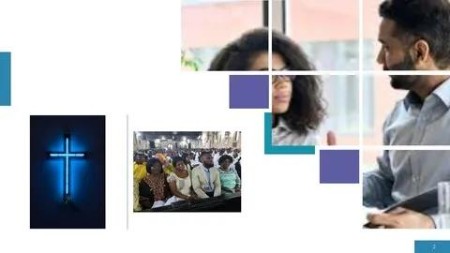Most Commented
The Effective Church Secretary/Administrator




Description material

The Effective Church Secretary/Administrator
Published 10/2024
MP4 | Video: h264, 1280x720 | Audio: AAC, 44.1 KHz
Language: English | Size: 2.66 GB | Duration: 5h 21m
Leadership and Management Skills for Church Secretaries and Administrators. Learn Office Management and Boardroom Skills
What you'll learn
The course builds your leadership and management competencies for the delivery of administrative support to ministry.
At the end of the course, you will be able to identify the steps in delivering and/or writing good news, neutral news and bad news
Use ergonomics and technology to achieve efficiency in the church office
Demonstrate and apply professional knowledge for high performance in your role as secretary to the board and its committees.
Understand and use financial reports in documenting meetings.
Requirements
The course is open to church workers engaged in secretarial and administrative work.
Aspiring church workers also qualify to study the course.
Description
The Effective Church Secretary/Administrator Objective The course builds your leadership and management competencies for the delivery of administrative support to ministry.Course Outcome At the end of the course, you will be able to:· Demonstrate and apply skills and competencies for transforming the administrative support services in your church.· Use ergonomics and technology to achieve efficiency in the church office · Understand and use financial reports in documenting meetings. · Identify the steps in delivering and/or writing good news, neutral news, and bad news· Demonstrate and apply professional knowledge for high performance in your role as secretary of the council of elders and its committees. What You Will StudyWe will cover the following courses/modules:Module 11. Effective Leadership Styles, Skills, and Behaviour2. Leadership Roles3. Theories of Leadership: Traits, Behaviour, Situational4. Strategic Leadership, Charismatic, Transactional, Transformational and Servant Leadership5. Ethical, Spiritual, Authentic and Team Leadership6. Leadership Substitutes and NeutralisersModule 21. Leadership Communication Techniques2. Group leadership communication3. Virtual leadership communication4. Delivering good, neutral and bad news5. Writing business letters, memos and MOUs, reports and proposals6. Presentation Skills7. Techniques for planning, organising and delivering presentation with confidence8. Virtual interviews and meetingsModule 3Origins of the Office Functions and Divisions of the OfficeControlling Office Activities Duties and Responsibility of Key Office PersonnelPlanning Your Office Layout Achieving Efficiency in the OfficeStepping up Efficiency through Ergonomics and TechnologyWays to Improve Human Relations with Superiors, Colleagues and SubordinatesRecord-keeping and Information ManagementTechnology Integration in Office ManagementCreating a Positive Work-Life BalanceModule 41. The Board of Elders and Leadership2. Role, Composition and Membership of the Board3. Effectiveness of the Board of Elders4. Nomination Committee5. Succession Planning6. Effective Management of Members' Meetings7. Role of the Board Secretary8. Proxy, Polls and Voting9. Appointment and Evaluation of Proxies10. Board and Management Meetings11. Financial Reporting and Accountability12. Objectives of Financial Reporting13. The Audit Committee14. Using and Interpreting Financial Reports for DecisionMaking15. Determining the Gearing of your Church16. Financing Church Business Ventures17. Strategic Thinking in the Boardroom18. Developing Fundraising Strategies19. Leading Change within the Church CommunityBenefits· E-Certificate of Participation· Life-time Access· Downloadable Video Lessons· Downloadable Text Lessons· Quizzes
Overview
Section 1: MODULE 1 LEADERSHIP STYLES SKILLS AND BEHAVIOUR
Lecture 1 What You Will Cover in The First Course/Module
Section 2: UNIT 1 ACHIEVING GREATNESS IN YOUR ROLE AS A LEADER
Lecture 2 Unit 1 Introduction
Lecture 3 Unit 1 Session 1 Leadership is Influencing
Lecture 4 Unit 1 Session 2 Leadership Roles
Lecture 5 Unit 1 Session 3 The Idea of Church Leadership
Section 3: UNIT 2 HOW TO APPLY TRAIT, BEHAVIOURAL AND SITUATIONAL THEORIES
Lecture 6 Unit 2 Introduction
Lecture 7 Unit 2 Session 1 Trait Theory: Its Implications for the Church Leader
Lecture 8 Unit 2 Session 2 Behavioural Theory
Lecture 9 Unit 2 Session 3 Situational Theory
Section 4: UNIT 3 STRATEGIC, CHARISMATIC LEADERSHIP FOR TRANSFORMATION OF YOUR CHURCH
Lecture 10 Unit 3 Introduction
Lecture 11 Unit 3 Session 1 How to Use Strategic Leadership to Transform Your Church
Lecture 12 Unit 3 Session 2 Applying Charismatic Leadership as a Transformational Tool
Lecture 13 Unit 3 Session 3 Techniques for Achieving Transformation Through Influence
Section 5: UNIT 4 REMAIN A SERVANT SPIRITUAL ETHICAL AUTHENTIC LEADER TO AVOID SUBSTITUTION
Lecture 14 Unit 4 Introduction
Lecture 15 Unit 4 Session 1 How to Prevent Substitution by being a Servant and Team Leader
Lecture 16 Unit 4 Session 2 Ways to Remain Ethical, Spiritual and Authentic in Leadership
Lecture 17 Unit 4 Session 3 Overcome Challenges of Leadership Substitutes and Neutralisers
Section 6: UNIT 5 USE YOUR SKILLS AND QUALITIES. THEY ARE IMPORTANT
Lecture 18 Unit 5 Introduction
Lecture 19 Unit 5 Session 1 How to Use Regulatory Issues in Decision Making
Lecture 20 Unit 5 Session 2 Human Relations and Leadership
Lecture 21 Unit 5 Session 3 Use Your Skills and Qualities. They are Important
Section 7: MODULE 2 LEADERSHIP COMMUNICATION TECHNIQUES
Lecture 22 What You Will Cover in This Second Course/Module
Section 8: UNIT 1: GROUP COMMUNICATION AND DELIVERY OF NEWS
Lecture 23 Unit 1 Introduction
Lecture 24 Unit 1 Session 1 Communication: Form and When
Lecture 25 Unit 1 Session 2 Group Leadership Communication Skills
Lecture 26 Unit 1 Session 3 Delivering Good, Neutral and Bad News
Lecture 27 Unit 1 Session 4 Examples of Letters Delivering Good, Neutral and Bad News
Section 9: UNIT 2 WRITING BUSINESS LETTERS
Lecture 28 Unit 2 Introduction
Lecture 29 Unit 2 Session 1 The Elements of a Business Letter
Lecture 30 Unit 2 Session 2 The Mechanics of Writing Business Letters
Lecture 31 Unit 2 Session 3 Layout of a Business Letter
Lecture 32 Unit 2 Session 4 Examples of Business Leadership Letters
Section 10: UNIT 3 UNIQUENESS IN WRITING MEMOs AND MOUs
Lecture 33 Unit 3 introduction
Lecture 34 Unit 3 Session 1 Uniqueness in Writing Memos and MOUs
Lecture 35 Unit 3 Session 2 Writing Effective Reports
Lecture 36 Unit 3 Session 3 Writing Winning Proposals
Section 11: UNIT 4 PRESENTATION SKILLS
Lecture 37 Unit 4 Introduction
Lecture 38 Unit 4 Session 1 Plan Your Presentation
Lecture 39 Unit 4 Session 2 Organise and Develop Your Message
Lecture 40 Unit 4 Session 3 Deliver with Confidence
Section 12: UNIT 5 VIRTUAL INTERVIEWS AND MEETINGS
Lecture 41 Unit 5 Introduction
Lecture 42 Unit 5 Session 1 Virtual Interviews
Lecture 43 Unit 5 Session 2 Virtual Leadership Communication
Lecture 44 Unit 5 Session 3 Virtual Meetings and Decision Making Processes
Section 13: UNIT 6 CHAIRING AND COMMUNICATING AT MEETINGS
Lecture 45 Unit 6 Introduction
Lecture 46 Unit 6 Session 1 Techniques for Chairing Meetings
Lecture 47 Unit 6 Session 2 Role and Powers of the Chair
Lecture 48 Unit 6 Session 3 Rules of Debate
Section 14: MODULE 3 OFFICE MANAGEMENT AND ADMINISTRATION
Lecture 49 What You Will Study in this Third Module/Course
Section 15: UNIT 1 THE ORIGINS AND FUNCTIONS OF THE OFFICE
Lecture 50 Unit 1 Introduction
Lecture 51 Unit 1 Session 1 Origins of the Office
Lecture 52 Unit 1 Session 2 Functions of the Office
Lecture 53 Unit 1 Session 3 Controlling Office Activities
Section 16: UNIT 2 PLANNING YOUR OFFICE LAYOUT
Lecture 54 Unit 2 Introduction
Lecture 55 Unit 2 Session 1 Plan Your Office Layout
Lecture 56 Unit 2 Session 2 Achieving Efficiency in the Office
Lecture 57 Unit 2 Session 3 Stepping up Efficiency through Ergonomics and Technology
Section 17: UNIT 3 HUMAN RELATIONS IN THE OFFICE
Lecture 58 Unit 3 Introduction
Lecture 59 Unit 3 Session 1 Human Relations - What is it
Lecture 60 Unit 3 Session 2 Human and Organisational Relationships
Lecture 61 Unit 3 Session 3 Ways to Improve Human Relations
Section 18: UNIT 4 RECORD-KEEPING AND INFORMATION MANAGEMENT
Lecture 62 Unit 4 Session 1 Office Document Management
Lecture 63 Unit 4 Session 2 Document Storage Solutions
Lecture 64 Unit 4 Session 3 Information Security and Confidentiality
Section 19: UNIT 5 TECHNOLOGY INTEGRATION IN OFFICE MANAGEMENT
Lecture 65 Unit 5 Session 1 The Evolving Role of Technology
Lecture 66 Unit 5 Session 2 Office Software Applications
Lecture 67 Unit 5 Session 3 Cloud Computing and Virtual Collaboration
Section 20: UNIT 6 CREATING A POSITIVE WORK-LIFE BALANCE
Lecture 68 Unit 6 Session 1 Effective Leadership in the Office
Lecture 69 Unit 6 Session 2 Building and Managing High Performing-Teams
Section 21: MODULE 4 CHURCH BOARD OF ELDERS
Lecture 70 What You Will Cover in this Fourth Module/Course
Section 22: UNIT 1 THE BOARD OF ELDERS/DIRECTORS
Lecture 71 Unit 1 Introduction
Lecture 72 Unit 1 Session 1 Church Board of Elders
Lecture 73 Unit 1 Session 2 Role and Membership of the Board
Lecture 74 Unit 1 Session 3 Nomination Committee and Succession Planning
Section 23: UNIT 2 EFFECTIVENESS OF THE BOARD
Lecture 75 Unit 2 Introduction
Lecture 76 Unit 2 Session 1 Effectiveness of the Board of Elders
Lecture 77 Unit 2 Session 2 Meetings of Members
Lecture 78 Unit 2 Session 3 Proxies
Section 24: UNIT 3 POLLS, VOTING, BOARD AND MANAGEMENT MEETINGS, FINANCIAL REPORTING
Lecture 79 Unit 3 Introduction
Lecture 80 Unit 3 Session 1 Polls and Voting
Lecture 81 Unit 3 Session 2 Board and Management Meetings
Lecture 82 Unit 3 Session 3 Understanding and Using Financial Reports
Section 25: UNIT 4 ENSURING ACCOUNTABILITY, FINANCIAL ANALYSIS IN THE BOARDROOM
Lecture 83 Unit 4 Introduction
Lecture 84 Unit 4 Session 1 Accountability and Transparency
Lecture 85 Unit 4 Session 2 Understanding Financial Planning
Lecture 86 Unit 4 Session 3 Financial Analysis in the Boardroom
Section 26: UNIT 5 INTERPRETING LIQUIDITY, CASH BUDGETS AND GEARING FOR DECISION -MAKING
Lecture 87 Unit 5 Introduction
Lecture 88 Unit 5 Session 1 Interpreting Liquidity in the Boardroom
Lecture 89 Unit 5 Session 2 Cash Management Decisions in the Boardroom
Lecture 90 Unit 5 Session 3 Interpreting the Gearing of Your Church
Section 27: UNIT 6 STRATEGIC THINKING IN THE BOARDROOM
Lecture 91 Unit 6 Introduction
Lecture 92 Unit 6 Session 1 Strategic Thinking in the Boardroom
Lecture 93 Unit 6 Session 2 Using the Strategic Planning Model
Lecture 94 Unit 6 Session 3 Matching Vision with Mission
Intended for Church Secretaries, Board Secretaries, Committee Secretaries, Administrators

FileAxa
https://fileaxa.com/tzjy48vsf9x7/The.Effective.Church.SecretaryAdministrator.part1.rar
https://fileaxa.com/up6ovh9jae3a/The.Effective.Church.SecretaryAdministrator.part2.rar
DDownload
https://ddownload.com/emex1g9j08jt/The.Effective.Church.SecretaryAdministrator.part1.rar
https://ddownload.com/kt2hlnh30lia/The.Effective.Church.SecretaryAdministrator.part2.rar
RapidGator
https://rapidgator.net/file/019aaa46bb591b2b1e3e65ab42d89eea/The.Effective.Church.SecretaryAdministrator.part1.rar
https://rapidgator.net/file/a33677497656f6cee73d6fec2f7171c0/The.Effective.Church.SecretaryAdministrator.part2.rar
FileStore
TurboBit
https://turbobit.net/n6vbrl2052pa/The.Effective.Church.SecretaryAdministrator.part1.rar.html
https://turbobit.net/dke544v016dj/The.Effective.Church.SecretaryAdministrator.part2.rar.html
Join to our telegram Group
Information
Users of Guests are not allowed to comment this publication.
Users of Guests are not allowed to comment this publication.
Choose Site Language
Recommended news
Commented



![eM Client Pro 9.2.1735 Multilingual [Updated]](https://pikky.net/medium/wXgc.png)



![[PORTABLE] EF Commander 2022.07 Multilingual](https://i.postimg.cc/Gm8TPyV9/EF-Commander.png)


![Movavi Video Editor 24.0.2.0 Multilingual [ Updated]](https://pikky.net/medium/qhrc.png)

